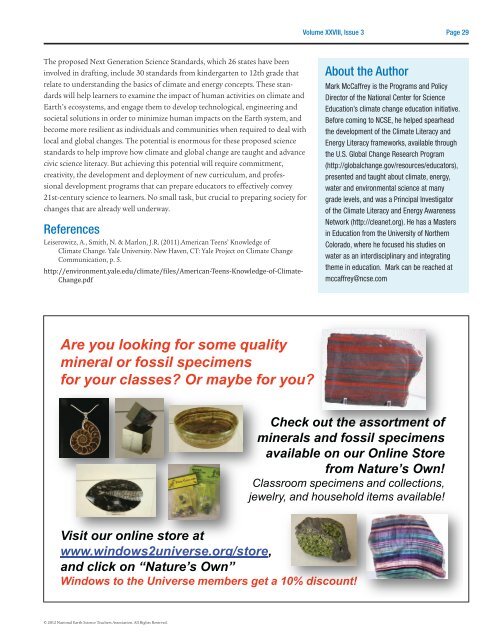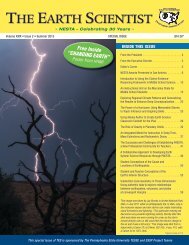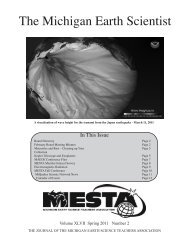The Earth Scientist
Fall 12.pdf - NESTA
Fall 12.pdf - NESTA
- No tags were found...
You also want an ePaper? Increase the reach of your titles
YUMPU automatically turns print PDFs into web optimized ePapers that Google loves.
Volume XXVIII, Issue 3<br />
Page 29<br />
<strong>The</strong> proposed Next Generation Science Standards, which 26 states have been<br />
involved in drafting, include 30 standards from kindergarten to 12th grade that<br />
relate to understanding the basics of climate and energy concepts. <strong>The</strong>se standards<br />
will help learners to examine the impact of human activities on climate and<br />
<strong>Earth</strong>’s ecosystems, and engage them to develop technological, engineering and<br />
societal solutions in order to minimize human impacts on the <strong>Earth</strong> system, and<br />
become more resilient as individuals and communities when required to deal with<br />
local and global changes. <strong>The</strong> potential is enormous for these proposed science<br />
standards to help improve how climate and global change are taught and advance<br />
civic science literacy. But achieving this potential will require commitment,<br />
creativity, the development and deployment of new curriculum, and professional<br />
development programs that can prepare educators to effectively convey<br />
21st-century science to learners. No small task, but crucial to preparing society for<br />
changes that are already well underway.<br />
References<br />
Leiserowitz, A., Smith, N. & Marlon, J.R. (2011).American Teens’ Knowledge of<br />
Climate Change. Yale University. New Haven, CT: Yale Project on Climate Change<br />
Communication, p. 5.<br />
http://environment.yale.edu/climate/files/American-Teens-Knowledge-of-Climate-<br />
Change.pdf<br />
About the Author<br />
Mark McCaffrey is the Programs and Policy<br />
Director of the National Center for Science<br />
Education’s climate change education initiative.<br />
Before coming to NCSE, he helped spearhead<br />
the development of the Climate Literacy and<br />
Energy Literacy frameworks, available through<br />
the U.S. Global Change Research Program<br />
(http://globalchange.gov/resources/educators),<br />
presented and taught about climate, energy,<br />
water and environmental science at many<br />
grade levels, and was a Principal Investigator<br />
of the Climate Literacy and Energy Awareness<br />
Network (http://cleanet.org). He has a Masters<br />
in Education from the University of Northern<br />
Colorado, where he focused his studies on<br />
water as an interdisciplinary and integrating<br />
theme in education. Mark can be reached at<br />
mccaffrey@ncse.com<br />
Are you looking for some quality<br />
mineral or fossil specimens<br />
for your classes? Or maybe for you?<br />
Check out the assortment of<br />
minerals and fossil specimens<br />
available on our Online Store<br />
from Nature’s Own!<br />
Classroom specimens and collections,<br />
jewelry, and household items available!<br />
Visit our online store at<br />
www.windows2universe.org/store,<br />
and click on “Nature’s Own”<br />
Windows to the Universe members get a 10% discount!<br />
© 2012 National <strong>Earth</strong> Science Teachers Association. All Rights Reserved.






